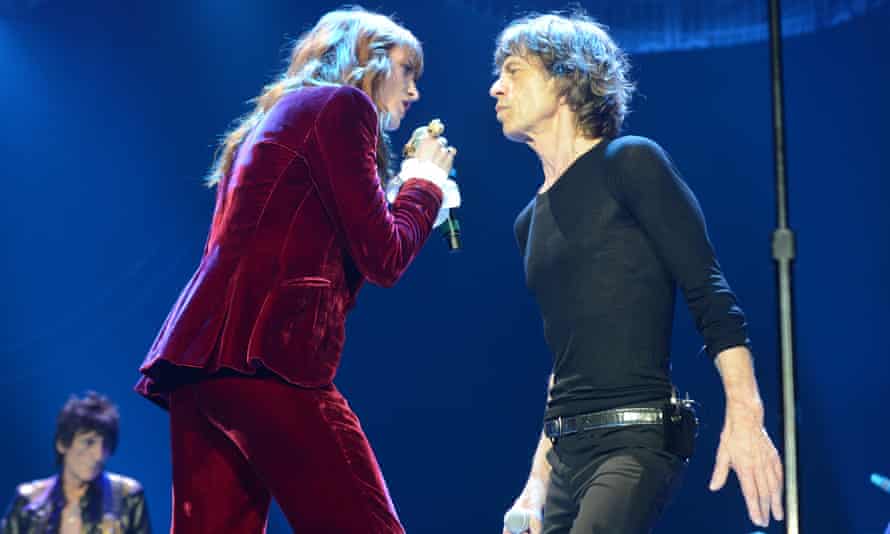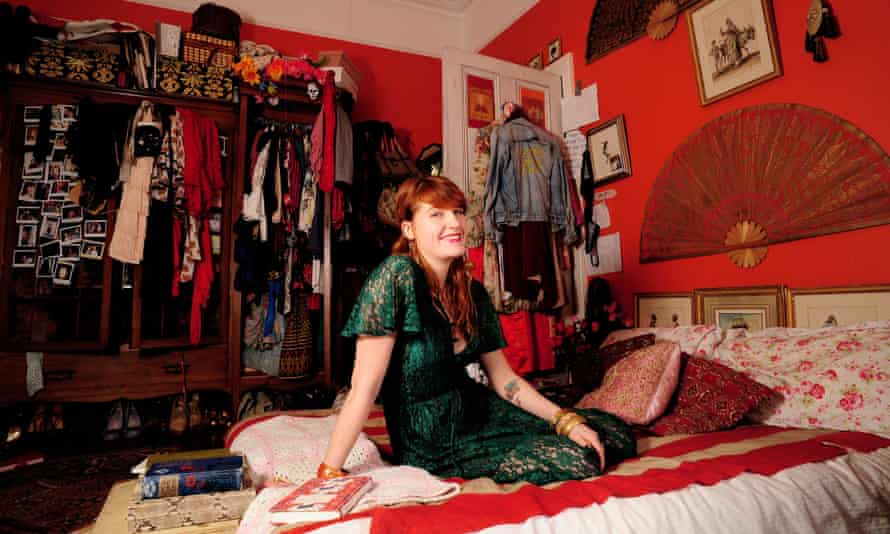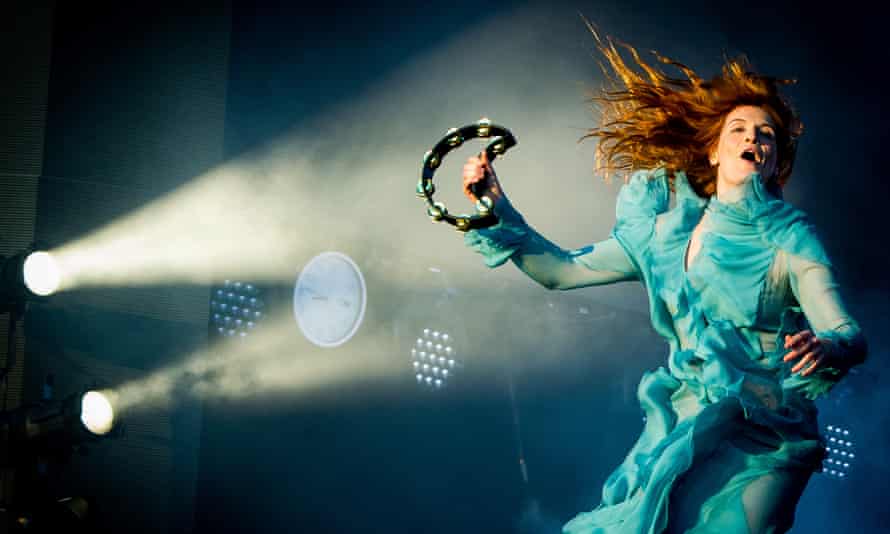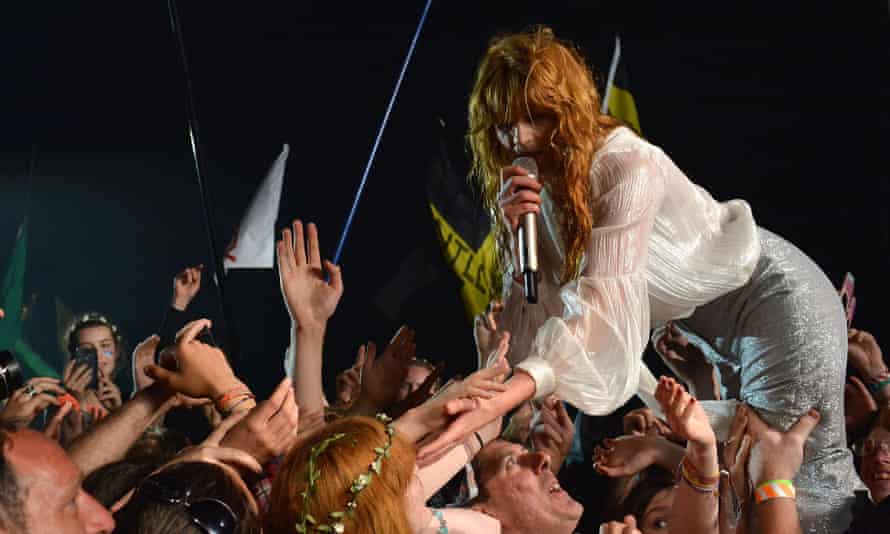The other night, in an unusually high spring wind, Florence Welch’s electronic doorbell malfunctioned, repeatedly ringing through the small hours as though pressed by the finger of some ghostly hand. Sleep has always been a sensitive issue (her manager used to have to wake her very carefully on tour), so she went out and ripped the entire unit off the wall. As a child – in fact, not only as a child, but until she was 26 years old, had two No 1 albums and had performed with the Rolling Stones – Welch slept on a mattress on the floor of her mother’s living room, with books stacked around her head and three of her late grandmother’s paintings forming a makeshift headboard, which would regularly fall on her.
Her first bedroom had been decoupaged right up to the ceiling – an attempt to externalise the contents of her head: “I would have been 10. Some girls at school were being mean to me and I just remember sitting at home thinking” – she affects a melodramatic voice – “‘If they would just see this room, they would understand and they would love me!’”
Dance Fever is Welch’s first album in four years. Like Ed Sheeran or Adele, she is a survivor of that tense period at the end of the 00s when the industry decided that no one was buying recorded music any more. Her rise was steep and surprising: at 23, her debut album, Lungs, launched her on an 18-leg world tour that culminated in support slots for U2. Big gigs, and a big voice, made her a household name but her artistic paraphernalia has always been part of the package: there was a book club with fans (it’s still running) and a couple of years back, a volume of Welch’s poetry.
Today, she sits in a small room in the garden of an art gallery in Camberwell, near where she grew up and attended art college for a while. Four or five large rings chime on her expressive hands: her hair is whirled into a high ponytail which she occasionally releases, with a flick of her fingers, to punctuate a joke or a moment of drama, before piling it back up again.
Welch’s parents divorced when she was 13, and when her mother, an esteemed history professor, married their next-door neighbour, she acquired two new siblings overnight and became even more protective of her own space (her little brother slept in the linen closet). But her stepfather’s late wife had left behind an Arts and Crafts chandelier and a huge gothic fireplace, both of which fed into an aesthetic that has never left her – 13 years after her debut album she still puts one in mind of John Singer Sargent’s Ellen Terry, or the Lady of Shalott in a vintage Laura Ashley dress.
Quick Guide
The Florence machine: career highlights
Show
1986
Florence Leontine Mary Welch is born in Camberwell, south London, on 28 August to advertising executive Nick Russell Welch and Evelyn Welch, professor of Renaissance studies.
1999
When Welch is 13, her parents divorce; her mother later marries immunologist and lung specialist Peter Openshaw. Welch is educated at Thomas’s prep school, Battersea, and Alleyn’s school, south-east London; she later starts studying at Camberwell College of Arts before dropping out.
2006
Welch begins performing with musician Isabella Summers under the name Florence Robot/Isa Machine. The following year she records with the band Ashok, releasing the album Plans.
2009
After being promoted as part of BBC Introducing, Florence + the Machine’s debut studio album, Lungs, tops the UK albums chart after charting for 28 consecutive weeks; it later wins a Brit award for best British album.
2011
The band’s second album, Ceremonials, debuts at No 1 in the UK and No 6 on the US Billboard 200.
2012
Welch sings on Calvin Harris’s single Sweet Nothing, which is nominated for a Grammy. She performs Gimme Shelter with the Rolling Stones at the O2 in London.
2015
Florence + the Machine’s third album, How Big, How Blue, How Beautiful, is released. They headline Glastonbury festival after the Foo Fighters pull out.
2017
Welch appears in the Terrence Malick film Song to Song.
2018
The band’s fourth album, High As Hope, is released. Welch releases the book Useless Magic, a collection of lyrics, poems and illustrations.
2022
The fifth Florence + the Machine album, Dance Fever, is released.
Kathryn Bromwich
In person, Welch does not have the imperious air she has on stage: she seems to arrive filterless, fizzing with a nervy but rather humorous energy. In the video for her latest song, Free, she plays herself, while Bill Nighy has a cameo as her “anxiety”. Interviews are hard work, she says – she likes to schedule a day off afterwards to lie down. Harder than being on stage for two hours? “I think so, yes, because that’s scripted and you’re in control.”
Being on stage was, of course, a moot point until recently – this summer, she will tour for the first time in three years. Everyone knows that musicians had a terrible time in the pandemic but Welch, with her unusual directness, is a useful person to ask about it. What did she really think her prospects were?
“My mum said: ‘You’ll find something else to do,’” she says. “It felt incredibly final. I don’t know if that’s because musicians and performers lean towards dramatic thinking, but the reality was no one could say, before there was a vaccine, if gigs would ever come back. Maybe in five years, seven years. I often think about everyone meandering back into the world now with so much unprocessed PTSD.”
Welch told her mother: “I don’t really want to exist in a world where I can’t do the thing I feel like I was put on this Earth to do. The thing that gives me meaning, that makes the jumble in my head – which is a sort of screaming nightmare a lot of the time – make sense.” In print, this sounds a bit overblown but in person, she sounds almost apologetic.
Lately, she has been musing on what she calls the “monster of performance” – how it comes round every two years and swallows you up for a world tour. When it slunk off during the pandemic she felt “bereft”. In March 2020, she was in New York, writing songs for Dance Fever, with Jack Antonoff, known for his work with Lorde and Lana Del Rey. Back in south London, in lockdown, she moved her boyfriend in to her flat and wrote “sad little poems” instead, which turned into songs such as My Love (“my arms emptied, the skies emptied, the buildings emptied”). Unable to dance on stage, she danced in her kitchen (“I’m actually really good at wombling around in socks”). Yet Dance Fever, which was eventually produced in the UK with Dave Bayley from indie band Glass Animals, is no disco record. It may be high in BPM, but much of what she’s put on top is dark, strident, mournful: she has called it “Nick Cave at the club”.
She became fascinated with a historical phenomenon called choreomania, first recorded in the Holy Roman Empire in 1374, in which large groups of men, women and children would dance themselves into a manic state, to the point of exhaustion and occasionally death. There is a similar scene in Ari Aster’s Midsommar, one of the horror movies she watched during lockdown. In the video for Heaven Is Here, the first track released from Dance Fever, directed by the film-maker Autumn de Wilde, Welch and seven dancers in Victorian dresses throw their bodies around like bags of bones. The video was filmed in Kyiv a few weeks before the outbreak of war. Two of the dancers, Nastia and Maryne, are now refugees – when we spoke last month, Welch had tracked Nastia to Amsterdam but was still trying to locate Maryne.
“We had made it through the pandemic, everyone was so happy to be working again, and the general sense from the team was of freedom, of celebration,” she recalls. “And for them to not know what was around the corner – that it wouldn’t in any way bring people together, that we would emerge to be engulfed in another horror. I can’t even… I said to my Ukrainian friend: ‘I feel so helpless.’ She said: ‘It’s not helpless, we’re still holding on. I’ve never been sadder and I’ve never been prouder.’”
Florence Welch has clocked up an impressive career, one that spans the key moments in pop’s digital age. In 2009, she was described as the boho art-school alternative to pop urchins Kate Nash and Lily Allen, which really takes you back. Her apparent class privilege initially provoked some sneering reviews, and her jump to fame was questioned when she won the Brits critics’ choice award after just two singles. When she heard she’d won, she had a panic attack in a branch of Caffè Nero, as she later told the journalist Pete Paphides: “Why? Because I had done nothing and I was getting an award for it.” Welch emerged in an era, at the start of the digital landgrab, when new artists would arrive to great fanfare before they knew how to sing live, or even had an album to promote (often, by the time the album emerged, no one was interested any more).
Of her sudden rise to fame she says: “Although I’m grateful for it, it would have been good to have been allowed a bit more time to find my feet. The whole of Ceremonials [her second record] is just an album about someone being under so much pressure that they want to be at the bottom of the ocean.”
But as the music industry debates moved on, so apparently did the meaning of Welch. In 2011, during anxieties over controversial Rihanna videos, she was celebrated for her cleavage-covering frocks. “Parents who worry that their teenage daughters have few pop role models other than the intemperately sexual Rihannas of the world should be pleased that Florence Welch is back,” said one reviewer.
And here she is, still on the scene. From the start, she savvily put her focus on huge gigs. She supported U2 on her first tour. But when I ask her what she learned from joining the Rolling Stones on stage at the O2 in November 2012, she goes unexpectedly pink.
“I thought I knew the words to Gimme Shelter,” she says, “but I realised when I got to rehearsal that I didn’t know the specific words… I thought: ‘It’s the Rolling Stones, it’s a rock band, they’ll probably just wing it.’ Then I realised Mick Jagger doesn’t wing anything.”

Jagger clocked the fact that Welch didn’t know the lyrics to the song he’d invited her to perform for an audience of 20,000. “It’s ‘rape, murder’,” he corrected, when she gave a formless, emotive wail. “I remember running off to sit in the loos with the words after that. That’s what Mick Jagger taught me: fucking learn your lines.”
She still feels traces of the old anxieties she felt at the start of her career. “Is it the loss of anonymity?” she wonders. “The loss of who you might have been had you not become famous? The loss of a private person, someone who will walk through the street and be unknown?”
Would she welcome that anonymity back?
“Who am I kidding? I’m a fucking showboat.”
“For someone who drank so much,” she observes, “it was so clear from the start I wasn’t suited to it. Even without the drinking and hangovers, I’m an incredibly anxious person with a lot of ups and downs. How did I manage?” She has been sober since 2014; at her lowest points, she’d fail to show up to studio sessions, or when she did, get through the days with monumental hangovers, “pulling songs out of me. I’d be so hungover that making work was kind of agony.”
She drank to perform – and when tours ended, she whirled from one experience to another, waking up in strange places, losing days in one endless, slightly terrifying afterparty.
In 2018, in the lyrics to her song Hunger, Welch wrote about an eating disorder in her teenage years (“At 17 I started to starve myself”). She filled her life with anxiety about food, relationship chaos and alcohol – “and now I’m 35,” she says, “things are relatively stable, and all the things that I would be spinning to distract me from myself have stopped, because I’ve identified what they are. They don’t work any more; I’m too tired to have relationship chaos, I can’t do it! I don’t have time for people who don’t text me back. It doesn’t give me the same drug that it did.”
Instead, she says, “being in the flow of making a song is one of my absolute favourite places to be. And that really has got so much better since I got sober: it’s such a lie that chaos is creativity.”
Without the old crutches of bad men and booze, Welch has had to face older psychological complexes. “All the things that I ran from, I now bring as close to me as I can,” she sings on her new song Prayer Factory. So, what are those things she ran from? “It’s so boring,” she says, with a collapse of the ponytail: “I want to be the one person who says: ‘It’s not my childhood! It’s not my mum!’”
In the previous chapters of Welch’s story, Evelyn Welch, soon to become the first female vice-chancellor of Bristol University, has featured as a gently disapproving voice, once saying “what a waste of a brain” when her daughter told her she could remember every outfit she’d ever worn, and approaching Florence’s career with an “I don’t want to talk about your music, I care about you” attitude.
I ask Welch whether she feels any creative affinity with the Renaissance scholar, who has specialisms in the early modern fashion economy, and gives a dazzling lecture. “No, she lives in her head,” she replies. “She lives almost entirely in her head, in academia. She was always writing books when we were younger, and she’s very happy on her own with her books and her work. My sister wanted warmth, a consistent or traditional mothering, but I admired someone who could live in her head, because I did the same. Which is good and bad, because I’m very good at being loved from a distance – I think that says so much about going on and being famous…”

Although these days she describes her mother as “quite sweetly proud of her”, it is refreshing to hear a pop star analyse their need for the adulation of crowds, and admit they have no problem whatsoever with being loved at a remove. Being loved close up, by contrast, “kind of feels like being crushed”, Welch says in Girls Against God. She is now in a stable relationship with an unnamed and very “maternal” man, and that presents a whole new challenge. “I keep thinking that what I really want is to be in a room, on my own, with my dreams and fantasies and my weird house-slash-art-installation. But then the clock ticks forward a couple of hours, and you realise that you’re alone, and this thing that you think has worked for you for so long is not sustaining you any more.”
When she took off for New York before the pandemic, she was 33: the intention, she says, was to have “one last year to be completely insane, one last year under the wire, before getting serious”.
There seems to be, at the heart of Dance Fever, a desire to talk about motherhood in a new way: “To be a performer,” she writes in an accompanying press statement, “but also to want a family, might not be as simple for me as it is for my male counterparts.” Welch wants to look more deeply at the split inside female performers when faced with the assumption that should they want to have children, they’ll disappear for five years, or remake their career in a new image entirely. What if you want children but don’t want to stop? Are you allowed to say that?
“I think we’re still at the very beginning of women not dropping out,” she says. “We’re at the start of a conversation. There’s a lot more female artists out there. There’s more space for us. It felt like you were on your own at the beginning.”
She is pretty upfront about it all and she’s doing the maths. She’s 35. The album and world-tour cycle takes two years, and she’s just got one coming up. The gap between 35 and 40 suddenly seems rather small. Touring is a bodily commitment, and so is pregnancy. The desire for a child creeps on, she jokes, “like body horror”, spreading her long fingers up from her waist.

She raises an eyebrow at her parents’ generation who say they just got on with it, and let their babies sleep in baskets under the table in the pub. “People go into it saying: ‘I want to have a baby but I don’t want my life to change.’ It is completely upended. I don’t think I’m under any illusions about what it entails.”
She told her boyfriend she wished he was the one with the womb. She would make “a great, unreconstructed 1950s father”, she says: “I love providing, I love being out there and being off and coming back and being fun and being cuddled.” While making music is a “fever”, the desire for motherhood is a “haunting” – an encroaching feeling of wanting something different, of the old ways not working any more.
“The irony is, it’s all converged at this time where I felt like I really knew what I was doing, finally,” she says. “I’ve figured out how to be responsible for myself and my work and show up for it. I’m finally able to be in control of it in ways that I never have before, but then there’s this creeping sense of being irresponsible about something else, for fuck’s sake…”
The desire to settle down to some domestic life – this new, “creeping body horror” – still feels illogical. If she doesn’t do it, if she “makes that sacrifice”, then she needs to be the best, she tells me. But she wants it, and that’s the problem.
One of the things you often hear about Welch, and it’s generally from middle-aged men, is “my 12-year-old daughter likes her”. That first wave of 12-year-olds are getting on for 25 now, and Welch has not mastered TikTok – unlike Madonna – so whether she amasses a new generation of child fans remains to be seen. Meanwhile, there are other changes in her crowd. Around 2015, she started to experiment with suits on stage – “through osmosis, watching male performers, it was the physicality that I took on board” – and noticed that once she did so, she started getting headline slots, including 2015’s Glastonbury festival. “I thought: ‘Did I get through the door by evoking something familiar?’ It wasn’t intentional, but it was interesting that it changed when I became this masculine figure.”
Welch has never shied away from the God delusions of rock and pop stars, and Dance Fever is full of them. She positions herself as next in line to the Micks and Iggys of the world: “You said that rock’n’roll is dead but is that just because it has not been resurrected in your image? Like if Jesus came back but in a beautiful dress.” Does she consider herself a rock star?

“Pop star and rock star, I don’t really know what they mean now,” she says. “Honestly, some of the people who would be considered ‘pop’ stars are the most rock’n’roll people I know.”
Like who?
“Like Rosalía and Charli XCX, and Lizzo – they’re embodying this spirit of rock’n’roll. They’re doing exactly what they want, and the joyful confidence of it, and the attitude…”
She was always ashamed, she says, of her own “genrelessness”. “I felt like if I had a genre and I could stick to it, that’s when they’d take me seriously.” But men are “getting better at it” she says – meaning, they’re getting better at liking Florence + the Machine. “More men seem to take it seriously than they did before. I don’t know if it’s just longevity. Because I’ve stuck around, things seem to be changing for me. There’s been different phases but I think generally, who I am and what I like hasn’t really changed. Occasionally I’ve flirted with minimalism but it never really worked! People are finally thinking: ‘Oh, this is real! This is just the way she is.’”
Not long after Florence + the Machine first emerged, there was another debate in the music industry, fuelled by the internet, about how real or fake you were as an artist – as people’s previous musical incarnations, before they hit on the aesthetic that sold them, were found to be on display on YouTube, in open-mic clips, for ever more. But there is no alternative Welch hidden away, and what you see before you, in the vintage Laura Ashley dress, has its roots far back, in a gothic fireplace, decoupaged walls and a grandmother’s paintings falling on her head. She still decorates her hotel rooms with shawls and candles when she goes on tour.

A while back, she expanded on the events that fed into her formative years, after her parents’ divorce, revealing that her grandmother killed herself when she was 14. Today she tells me: “She jumped from her apartment in New York. She sat on the window ledge for a while, I think. She was manic depressive, she’d read all night and sleep during the day, and then the whole cycle would begin again.”
Welch has considered the shadows passed from grandmother to mother and daughter: “I think her pain echoed down to my mother and then to me. My mother has put an absolute lid on it, in the most impressive way. I didn’t inherit the lid, you know; I’m leaky and everything pours out.”
She has started to become more distrustful of the introversion she has always fetishised. “The comfort of being alone with just my books and my things and just me in my head – it’s not working any more. People are good. Letting people in is good.”
Stay connected with us on social media platform for instant update click here to join our Twitter, & Facebook
We are now on Telegram. Click here to join our channel (@TechiUpdate) and stay updated with the latest Technology headlines.
For all the latest Music News Click Here
